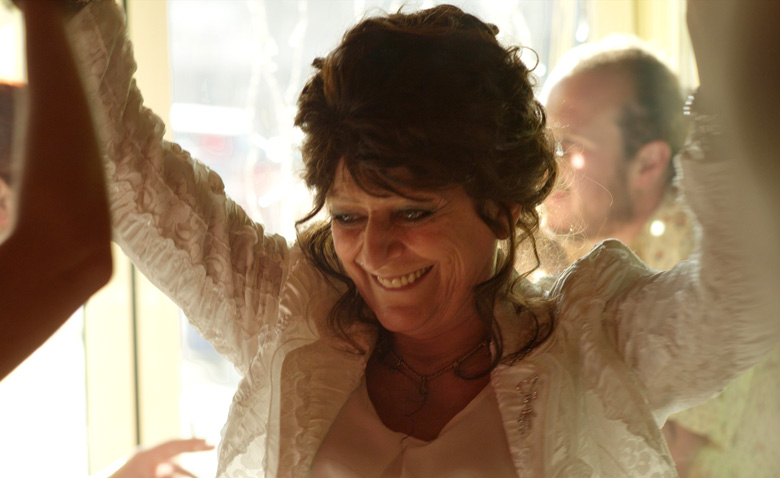
The third of a trio of films with ‘Girl’ in the title that played Cannes today (the terrific “Girlhood” and the execrable “That Lovely Girl” being the other two), “Party Girl,” written and directed by Marie Amachoukeli-Barsacq, Claire Burger and Samuel Theis firmly occupies the middle slot in terms of quality. It’s a heartfelt and undoubtedly well-meaning film, attempting a character study of a woman of an age and lifestyle that makes her an unusual and therefore unusually worthy subject. But Angelique’s overriding characteristic is that she is incapable of fundamental change which makes her at best a frustrating protagonist for this drama, which essentially describes a complete circle and eventually leaves her exactly back where we found her, only having hurt a few more people along the way. Perhaps this would not be quite such an issue if the tone of the film were not so firmly established from the outset, but already a few scenes in we know that either the filmmakers are going to be truthful to Angelique and have her go nowhere, or they’re going to sell out the story’s realism in order for something to surprising to happen. We suppose it’s to their credit that they go the former route, but it does make for an enervating watch which ultimately has little to say, except the depressing and rather well-worn conclusion that you cannot escape who you are.

So who is she? Angelique is a “cabaret girl” at the end of her viable career as an exotic dancer, and possibly a bit beyond that. Her client roster has withered, and she now spends most of her working evenings propping up the bar, occasionally needing to be carried up to bed, while the younger girls shake their stuff on the stage. Still she is one of them, regarded almost as a mascot by the younger ones while reminiscing about past glory with the older ones, and it’s clear that the seedy club in this German/French border town is her home as well as her workplace. There is of course an inherent pathos in the idea of a person who has most of her life made money from her body, still clinging to that lifestyle and that attitude long after the goods have started to go south. One day, presumably depressed by another night of no-shows, Angelique tracks down an ex-regular, Michel, at his home and a tentative romance begins. Michel is kind, and funny and is in love with Angelique, and he asks her to marry him. He’s offering his heart and his home and a future away from the humiliations and rejections of the club, so she accepts. But though she has made flirtation and coquettishness a way of life, she finds she cannot bring herself to have sex with him, and so she puts it off until after the wedding, a strategy that we kinda suspect may not have the best outcome.
It’s something of a surprise then (and one of the instances where the filmmakers’ inexperience may show itself in some hiccuppy storytelling) to discover that Angelique has four grown children and two grandchildren. The youngest of her kids is Cynthia, who is 16, but has been living with a foster family since she was 6, and with whom Angelique, through never fully explained feelings of guilt has largely lost contact. Encouraged by her other children, though, she writes to invite Cynthia to the wedding. And, in another example of a potentially dramatic avenue introduced only to fizzle away, Cynthia agrees and is very happy to reconnect with her mom and siblings and there we have it.

The only real conflict that Angelique ever experiences is internal–every one else seems incredibly willing to bend over backward to deliver her golden shot at a new beginning, but the lure of long-ingrained habits, even those that have led to misery in the past, will inevitably prove too strong for her. At one point, ever so briefly, we did suddenly start to wonder if in fact this was kind of great thing, that here’s a woman so much herself that even when served up an easy, cushy way out on a silver platter, she turns it down in favor of being true to her fierce independence, or even to her childish idealism… but no. It’s hard to read Angelique’s eventual fate as anything but a relapse. It’s a retreat back into a way of life that might be miserable, but it’s a misery she knows so well, like the seedy nightclub, that it feels more like home than happiness does.
Lead actress Sonia-Theis Litzemburger underplays Angelique with lived-in warmth — her face, even when impassive speaks volumes about the storied life she’s led — and Joseph Bour makes a strong impression as the steady, devoted Michel, but all the cast are underserved by the inertia of the story and the indifferent shooting style. And ultimately the chief problem lies deeper: it’s that while the filmmakers clearly have compassion for Angelique, they rather fail to communicate that with any urgency and her story never surprises and never truly moves us. Taking place under a leaden cloud of inevitability and charting the depressingly inexorable botching of a second chance, what does “Party Girl” ultimately have to tell us about the world? What have we, or she, learned by the end of this 95 minutes? Nothing particularly good, and nothing particularly new. [C]
Browse through all our coverage of the 2014 Cannes Film Festival by clicking here.

